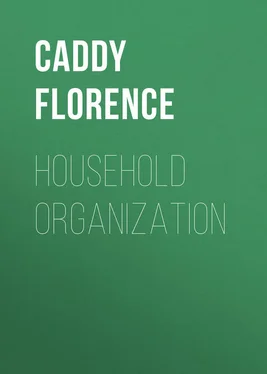Florence Caddy - Household Organization
Здесь есть возможность читать онлайн «Florence Caddy - Household Organization» — ознакомительный отрывок электронной книги совершенно бесплатно, а после прочтения отрывка купить полную версию. В некоторых случаях можно слушать аудио, скачать через торрент в формате fb2 и присутствует краткое содержание. ISBN: , Жанр: foreign_antique, foreign_prose, на английском языке. Описание произведения, (предисловие) а так же отзывы посетителей доступны на портале библиотеки ЛибКат.
- Название:Household Organization
- Автор:
- Жанр:
- Год:неизвестен
- ISBN:http://www.gutenberg.org/ebooks/34097
- Рейтинг книги:5 / 5. Голосов: 1
-
Избранное:Добавить в избранное
- Отзывы:
-
Ваша оценка:
- 100
- 1
- 2
- 3
- 4
- 5
Household Organization: краткое содержание, описание и аннотация
Предлагаем к чтению аннотацию, описание, краткое содержание или предисловие (зависит от того, что написал сам автор книги «Household Organization»). Если вы не нашли необходимую информацию о книге — напишите в комментариях, мы постараемся отыскать её.
Household Organization — читать онлайн ознакомительный отрывок
Ниже представлен текст книги, разбитый по страницам. Система сохранения места последней прочитанной страницы, позволяет с удобством читать онлайн бесплатно книгу «Household Organization», без необходимости каждый раз заново искать на чём Вы остановились. Поставьте закладку, и сможете в любой момент перейти на страницу, на которой закончили чтение.
Интервал:
Закладка:
Think of the time alone consumed in this, and the breakage; and this merely in the meals.
I am not considering the houses which require a complement of ten servants to keep their machinery in motion, as these do not form part of my subject; but this slight calculation will enable us to form some estimate of the cost of maintaining a large retinue.
We may well ask why we have drifted into this enormous expenditure, and for what purpose we have gradually let our houses be filled up by a greedy and destructive class, who, notwithstanding many bright exceptions, seem to combine the vices of dirt, disorder, extravagance, disobedience, and insolence. Why, indeed? For this simple reason, that we are idle. Gloss it over as we may, by calling it a desire to secure time for higher ends, the truth remains the same; we have neglected our duty in order that we may live in idleness and devote ourselves to pleasure. But if our lives are to be spent in pleasure, we shall ourselves degenerate; for pleasure wears out the body more than work, and excitement more than both. Let us take our appointed burden of steady work, and bear it onwards cheerfully and patiently. By so doing we shall feel it grow gradually lighter. It is not such slavery as the oar to which we chain ourselves. The artificial strain on our lives must be kept up by stimulants, and idleness must be roused by excitement. But our routine of gaiety is no idleness; and as for its name – gaiety – there never was a term more false. The gaiety is a hollow mockery, masking fatigue, untruth, and disappointment.
Sidney Smith says, "One of the greatest pleasures of our lives is conversation." If we will simply allow ourselves to talk upon subjects of common interest, we shall find social gatherings less wearisome than when we have to manufacture small-talk for civility's sake alone. If we meet together for enjoyment instead of for display, we shall replace dissipation – mere dissipation of time (what an endeavour for mortals, whose time is their life!) – by gaiety of heart, which is the best restorative to wearied spirits.
Let us Englishwomen make a strong effort to rescue ourselves from this bondage, this constant drain on our resources; and, leaving to men the duty to the state, let us seek our work in what is our duty – the rule and guidance of the house, securing, as Ruskin says, "its order, comfort, and loveliness."
But especially must we insist upon its loveliness, which is the point most neglected in all that portion of our lives which does not lie immediately upon the surface.
THE REMEDY
Bad habits to be reformed – Late hours – Value of the long winter evenings – Simplicity of manners – Over-carefulness – Instruction to be gained from foreign nations – Our manners should be natural – Impedimenta in our households – Comparison of former times with our own – Children trained to habits of consideration – Young men and boys over-indulged – Reduction of establishments – Lady helps – What is menial work? – Picturesque occupation – What is lady-like – Amateur millinery – Two subjects for an artist – Taste – Plan of the book – Eugénie de Guérin.
Before speaking of work which has to be done in order to make our homes comfortable and beautiful, it is necessary to point out what ought not to be done.
We have fallen into one form of self-indulgence which goes far towards unfitting us for work, except under the stimulus of excitement. This is our national habit of keeping late hours.
This is an important matter, and one wherein every member of every family may, if he pleases, aid reform. This, unless we are printers, bakers, or policemen, is entirely in our own hands.
Later hours are kept in England than in any other part of the world, and they grow later and later. We read in the life of the Prince Consort how painfully he felt this difference between England and Germany; yet the latitude and climate of the two countries differ but little, and we are of the same race. It is merely a matter of custom.
Many persons pride themselves on breakfasting at ten o'clock, and nine is thought quite an early hour in comfortable houses. It is deemed aristocratic to breakfast late, as well as to dine late; and as the day begun at ten o'clock would be too short for people to have a probable chance of sleep at ten at night, they are obliged to sit up till after midnight. Thus the best hours of the day are wasted, and the health of many injured by remaining an unnecessary length of time in a gas or paraffin laden atmosphere.
This shows an astonishing contrariety of disposition on the part of persons of refined sensations, so completely does it reverse the order of nature, which gives us the early sunshine for our enjoyment. Sunrise is the only beautiful natural spectacle that we modern English do not care about, except once or twice in our lives, when we get a shivering glimpse of it from an altitude of many thousand feet above the level of the sea.
From six to six is the natural day throughout by far the largest half of the globe, and the nearer we bring our practice to this measure the better; taking our day of sixteen hours (two-thirds of the twenty-four) from six o'clock in the morning instead of from nine. Old folks in the country ask their young people what is the good of sitting up burning out fire and candle. We never ask ourselves this question in London. Many persons take a nap after their heavy dinner, and only begin to feel lively as the clock strikes ten. To these the midnight oil is invigorating.
We have a valuable provision of nature in our long winter evenings, reckoning them at from five till ten. This gives us time for study, which we need more than do southern nations, to learn to contend against our climate. The northern peoples are famed for their mental culture: Scotland and Iceland bear witness to this. This is the season, too, for work in wool, to provide warm garments which are not required in the south. The wise woman does not fear the cold when her household is clothed in scarlet. This is the time when we may gather round the lamp or the fireside, and draw closer the family links under the influence of social warmth and progress.
Simplicity in our meals and dress is another point in which we may unite economy of money, time, and trouble, with comfort to ourselves and a regard for the beautiful. We need not drift into the carelessness of the picnic style of living, which is but the parody of simplicity. The real picnic is only suited to a few exceptional days in the year, and these our holidays. We may have simple meals indoors which should have all the freedom of picnic without its inconveniences.
Do we not all remember Swiss breakfasts with pleasure: the thyme-flavoured honey, and the Alpine strawberries? Or, better still, those at Athens, where the honey of Hymettus is nectar, and the freshly made butter ambrosia; and our enjoyment of both was enhanced by the scent of the orange blossoms coming in at the open windows, and the sight of sunrise glowing on the purple hills? Or luncheons in Italy, under a pergola of vines, where a melon, macaroni, a basket of grapes, and a tricolour salad constituted the feast? 1 1 The tricolour salad imitates the Italian banner – red, white, and green. Green salad, beetroot, and cream, or white of egg whipped to snow.
These things dwell longer in our memories than does the aldermanic banquet.
Although every faculty need not be swamped in the gratification of the palate, our meals ought to give us pleasure. It is only when they are made of supreme importance that the satisfaction of a healthy appetite degenerates into mere greed, and what we call housekeeping means merely thinking of dinner.
Simplicity allows play (not work) to our higher faculties, which cannot be refreshed while we are overwhelmed with domestic cares.
Читать дальшеИнтервал:
Закладка:
Похожие книги на «Household Organization»
Представляем Вашему вниманию похожие книги на «Household Organization» списком для выбора. Мы отобрали схожую по названию и смыслу литературу в надежде предоставить читателям больше вариантов отыскать новые, интересные, ещё непрочитанные произведения.
Обсуждение, отзывы о книге «Household Organization» и просто собственные мнения читателей. Оставьте ваши комментарии, напишите, что Вы думаете о произведении, его смысле или главных героях. Укажите что конкретно понравилось, а что нет, и почему Вы так считаете.












